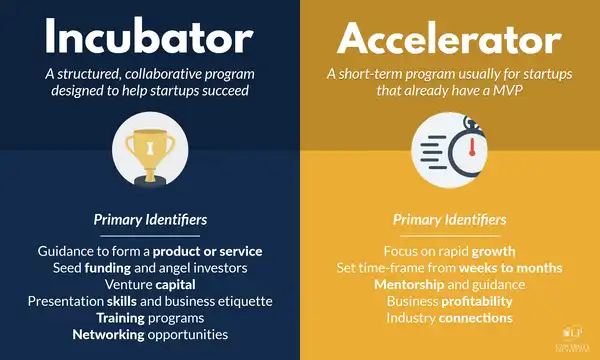Startup accelerators and incubators are designed to help startups grow and succeed by providing them with resources, mentorship, expert masterclasses and networking opportunities. Accelerators typically offer a short-term program that lasts a few months, while incubators offer a longer-term program that can last up to two years. Both programs are highly competitive, and startups must undergo a rigorous selection process to be accepted.

The selection process can vary depending on the program. Some programs require startups to submit an application that includes a pitch deck, business plan, and financial projections. Others may require startups to participate in an interview or pitch competition.
What are the Core Objectives of Startup Accelerators and Incubators?
The core objectives of accelerators and incubators are to help startups achieve key milestones and accelerate their growth.
For accelerators, the focus is on helping startups refine their business models, build their products, and secure funding. Incubators, on the other hand, as the name suggests, aim to provide a supportive environment where startups can develop their ideas, test their products, and build sustainable businesses.
What are some of the Key differences between Accelerators and Incubators?

While accelerators and incubators share some similarities, key differences exist between the two models. Accelerators tend to be more competitive and selective, focusing on startups that have already developed a minimum viable product (MVP) and are ready to scale. Incubators, on the other hand, are often more inclusive and open to startups at various stages of development, including those still in the ideation phase.
Another key difference between accelerators and incubators is the level of support and resources offered. Accelerators tend to provide more focused and intensive support, with a specific emphasis on mentorship and networking.
Meanwhile, incubators offer a broader range of resources and services, including office space, legal and financial support, and access to industry-specific expertise.
As an entrepreneur, it’s important to understand the differences between these two models and choose the one that best aligns with your business goals and needs.
Evaluation Criteria Accelerators and Incubators Use

When evaluating startups, accelerators and incubators use a set of criteria to determine which companies to accept into their programs. The following subsections outline the most common evaluation criteria.
Team Assessment
One of the most important criteria is the quality of the startup team. Accelerators and incubators look for teams with diverse skills, experience, and backgrounds. They also assess the team’s ability to work together and the chemistry between team members.
Market Potential
Accelerators and incubators evaluate startups’ market potential by examining the size of the market, the competition, and the target audience. What is the contribution of your business to the market?
They look for startups that address a large and growing market, have a unique value proposition, and target a specific niche within the market.
Business Model Viability
Accelerators and incubators assess the viability of a startup’s business model by examining its revenue streams, cost structure, and customer acquisition strategy. They look for startups with a clear path to revenue and profitability and a scalable business model to sustain growth.
Product Innovation
Accelerators and incubators evaluate the innovation and uniqueness of a startup’s product or service. They look for startups that are solving a real problem, have a unique value proposition, and bring something new to the market.
Selection Process
Startup accelerators and incubators are selective when it comes to choosing which startups to support. The selection process can be broken down into three main stages: application review, interviews and pitches, and due diligence.

Application Review
The first stage of the selection process is the application review. Accelerators and incubators typically have an online application form that startups fill out. The application form usually includes questions about the startup’s team, product, market, and business model. Accelerators and incubators use this information to assess whether the startup meets their selection criteria.
To increase your chances of being selected, answer all the questions on the application form thoroughly and concisely. It’s also important to tailor your application to the specific accelerator or incubator you’re applying to.
Show interest in the accelerator or incubator. Research it beforehand and highlight how your startup aligns with its mission and values. This will allow you to show genuine interest and understand their value.
Interviews and Pitches
The second stage of the selection process is interviews and pitches. If your application is successful, you’ll be invited to an interview or pitch day. This is an opportunity for the accelerator or incubator to better get to know you and your startup.
You’ll be asked questions about your team, product, market, and business model during the interview or pitch. You may also be asked to give a short presentation or pitch. The accelerator or incubator will use this information to assess whether your startup is a good fit for their program.
To prepare for the interview or pitch, make sure you have a clear and concise pitch deck that highlights the key aspects of your startup. Practice your pitch with your team and get feedback from mentors or advisors.
Due Diligence
The final stage of the selection process is due diligence. This is where the accelerator or incubator conducts a more thorough investigation of your startup. They’ll review your financials, legal documents, and any other relevant information.
To prepare for due diligence, ensure that your financials and legal documents are up-to-date and accurate. Also, be transparent with the accelerator or incubator about any potential issues or challenges your startup may be facing.
Post-Selection Strategy
After selecting the startups, accelerators and incubators have a post-selection strategy in place to help their portfolio companies grow and succeed. This strategy includes a range of activities, such as program engagement, milestone planning, demo days, and investor relations.
Program Engagement
Accelerators and incubators often provide a structured program to help startups develop their business. This program includes mentorship, workshops, and networking events. To get the most out of the program, it’s important to actively engage with the resources provided. This means attending events, meeting with mentors, and taking advantage of the workshops. By doing so, you can gain valuable insights and feedback that can help you refine your business strategy.
Milestone Planning
Another important aspect of the post-selection strategy is milestone planning. This involves setting specific goals and milestones for your business and tracking your progress towards these goals.
Doing this will help you stay focused and motivated and ensure that you’re making progress towards your long-term objectives. Accelerators and incubators can help you develop a milestone plan and provide guidance on how to achieve your goals.
Demo Days and Investor Relations
Finally, accelerators and incubators often provide opportunities for startups to showcase their business to potential investors. Demo days are events where startups can pitch their business to a room full of investors. This can be a great opportunity to get exposure and secure funding. Additionally, accelerators and incubators can provide guidance on how to approach investors and develop a strong investor pitch.
In conclusion, both accelerators and incubators are great for boosting your startup. But getting in requires passing tough evaluations, like intense scrutiny, detailed pitches, and thorough checks. The good thing is, once you’re in, it’s all about making the most of mentorship, hitting milestones, and connecting with investors. And don’t forget, confidence is key—it always comes in handy. Good luck getting in!
